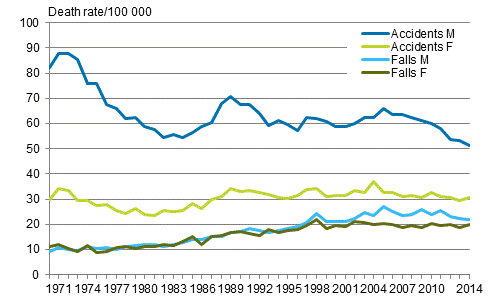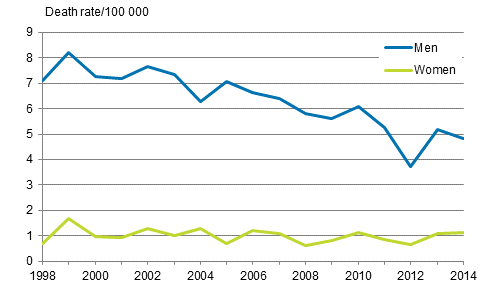5. Stumbling the commonest reason for fatal accidents
The most common reasons for deaths from accidents are fatal traffic accidents, fatal falls and stumbles, drownings, poisonings, and fatal fires. In this publication, all other poisonings apart from alcohol poisonings that belong to alcohol-related causes are considered accidents.
In 2014, accidents caused good four per cent of all deaths. Accidents were the cause of the death of over 2,200 persons, of whom 1,400 were men and 800 women. The total number of deaths from accidents has diminished slowly but nearly continuously since 2004. The decreased mortality is mainly due to a fall in the number of fatal traffic accidents. Women's accident mortality is clearly lower than men's but the accident mortality of men in particular has developed favourably in recent years and the difference between men and women is narrowing down.
Examined by age group, six out of ten persons who died from accidents in 2014 were aged over 65. Aged people in particular died from fatal stumbling and falls more than other age groups.
Figure 8. Accident mortality in 1970 to 2014

The commonest accident leading to death is stumbling or falling. In 2014, stumbling and falling caused the death of over 1,100 persons, which is around one-half of all fatal accidents. Approximately one-half of stumbling accidents took place inside one's home or in its immediate vicinity and one-quarter in care institutions. Nine out of ten stumbles resulting in death occurred to persons aged over 65. In absolute numbers, more deaths occurred among elderly women than elderly men but relative to the number of living people, elderly men had more stumbles resulting in death than women in relative terms.
The second most common fatal accidents were transport accidents. There were 255 deaths in transport accidents (excl. drowning accidents in water traffic) in 2014. The number of deaths has decreased by over one-third over the past ten years. Suicides are not included in deaths in transport accidents.
Drowning accidents usually include drowning from falling into water and drowning while swimming or boating. In 2014, a total of 161 persons died in drowning accidents of which 46 in water traffic. Most drowning victims, over 80 per cent, were men. Drowning deaths decreased clearly in a few previous years but the figures became gloomier again in 2013 (Figure 8).
There were clearly more deaths in fatal fires in 2014 than in the previous year. Fires claimed 70 lives, while in the year before, the number of victims was record low, 47. Seven out of ten victims were men. There were 44 deaths caused by the heat of sauna and 60 deaths caused by hypothermia.
Figure 9. Mortality from drowning accidents 1998 to 2014

Nearly half of those dying by drowning were intoxicated
In 2014, alcohol was a contributing factor in one in six fatal accidents, on average. Sixteen per cent of those who died in fatal accidents were intoxicated, i.e. 316 persons (Appendix table 2). Ten years ago, the corresponding share was 23 per cent of fatal accidents. In fatal accidents, intoxication means that the doctor signing the death certificate mentions that alcohol had contributed to the death. The figures exclude alcohol and drug poisonings where alcohol or drugs have not directly caused the death.
In 2014, intoxication was most common in deaths by drowning. Nearly half of those dying by drowning were under the influence of alcohol. Similarly, nearly half of the persons that died in fires or by hypothermia were also intoxicated. In traffic deaths, one in six were intoxicated at the time of death. By contrast, in stumbling accidents, of which a majority occurred among persons aged over 70, only one in ten were under the influence of alcohol.
Four out of five persons that died accidentally from drugs were men.
The total number of fatal poisonings (excl. alcohol poisonings) has fallen by 28 per cent from 2011. In 2014, their number was 243 cases, which was 51 fewer than in the year before. The average age of those dying of fatal poisonings was 39 years for men and 55 years for women.
In 2014, the number of deaths caused by drugs was 176, which is 25 fewer than in the previous year. When calculating drug-related deaths, Statistics Finland uses a classification (Selection B) compiled by the European Monitoring Centre for Drugs and Drug Addiction (EMCDDA) that publishes statistics and reports on its Internet site: www.emcdda.europa.eu .
According to the EMCDDA, cases where the underlying cause of death is drug psychoses, accidental poisoning, self-inflicted poisoning, and poisoning with undetermined intent are calculated as drug-related deaths. Deaths caused by drug psychoses are usually a result of drug addiction and long-term drug use. Accidental drug poisonings are cases where the death occurs shortly after the consumption of the substance. They can often also be referred to as overdoses. Self-inflicted poisonings with drugs are suicides. In 2014, twenty-nine suicides were committed with drugs. In poisonings with undetermined intent, the intent remains unclear.
Table 3. Drug-related mortality 2000 to 2014
| Total | Males | Females | Total | Males | Females | |
| Number | Number | Number | Per 100 000 mean population | Per 100 000 mean population | Per 100 000 mean population | |
| 2000 | 134 | 109 | 25 | 2,6 | 4,3 | 0,9 |
| 2001 | 110 | 78 | 32 | 2,1 | 3,1 | 1,2 |
| 2002 | 97 | 69 | 28 | 1,9 | 2,7 | 1,1 |
| 2003 | 101 | 76 | 25 | 1,9 | 3,0 | 0,9 |
| 2004 | 135 | 96 | 39 | 2,6 | 3,8 | 1,5 |
| 2005 | 126 | 95 | 31 | 2,4 | 3,7 | 1,2 |
| 2006 | 138 | 107 | 31 | 2,6 | 4,2 | 1,2 |
| 2007 | 143 | 116 | 27 | 2,7 | 4,5 | 1,0 |
| 2008 | 169 | 120 | 49 | 3,2 | 4,6 | 1,8 |
| 2009 | 175 | 130 | 45 | 3,3 | 5,0 | 1,7 |
| 2010 | 156 | 117 | 39 | 2,9 | 4,4 | 1,4 |
| 2011 | 197 | 156 | 41 | 3,7 | 5,9 | 1,5 |
| 2012 | 213 | 161 | 52 | 3,9 | 6,1 | 1,9 |
| 2013 | 201 | 148 | 53 | 3,7 | 5,5 | 1,9 |
| 2014 | 176 | 141 | 35 | 3,2 | 5,2 | 1,3 |
The drugs referred to in the EMCDDA's classification are mainly opioids. In addition to opioids, drugs also refer to cannabis and cannabinoids, other hallucinogens, and stimulants suitable for abuse, such as amphetamine and its derivatives. In 2014, four out of five drug-related deaths were associated with accidental overdoses of opioids.
The numbers of deaths have been calculated in accordance with the WHO's recommendation based on the substance judged as most influential. In many cases, the death is the result of multiple substance poisoning where the person has also digested other substances like alcohol and/or psychopharmacons.
Considerably fewer women than men die from drugs. In 2014, the share of women among all drug-related deaths was one fifth. Fifteen of the persons that died in accidents from drugs were women but in suicides committed with drugs, the share of women was clearly higher, 38 per cent. Most drug-related deaths in absolute numbers occurred among persons aged 25 to 29.
Source: Causes of death, Statistics Finland
Inquiries: Airi Pajunen 029 551 3605, Jari Hellanto 029 551 3291, kuolemansyyt@stat.fi
Director in charge: Jari Tarkoma
Updated 30.12.2015
Official Statistics of Finland (OSF):
Causes of death [e-publication].
ISSN=1799-5078. 2014,
5. Stumbling the commonest reason for fatal accidents
. Helsinki: Statistics Finland [referred: 19.4.2025].
Access method: http://stat.fi/til/ksyyt/2014/ksyyt_2014_2015-12-30_kat_005_en.html

